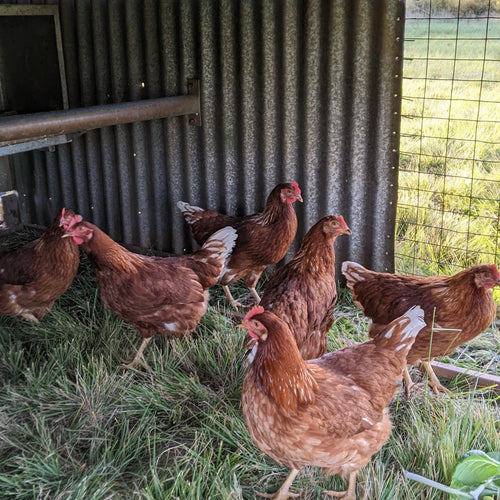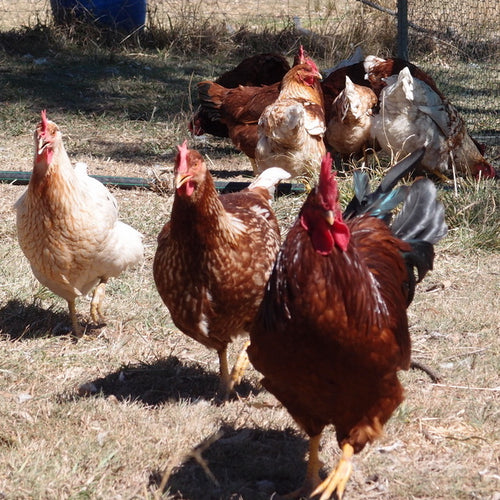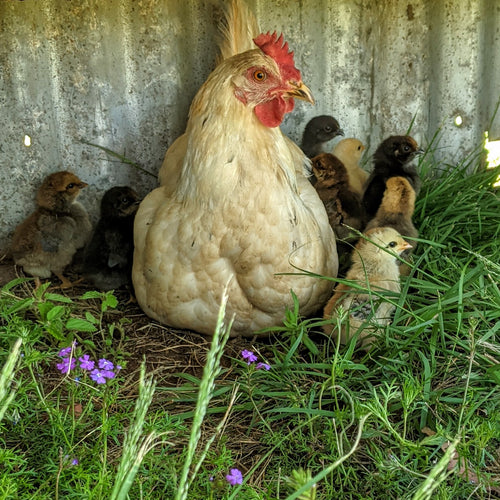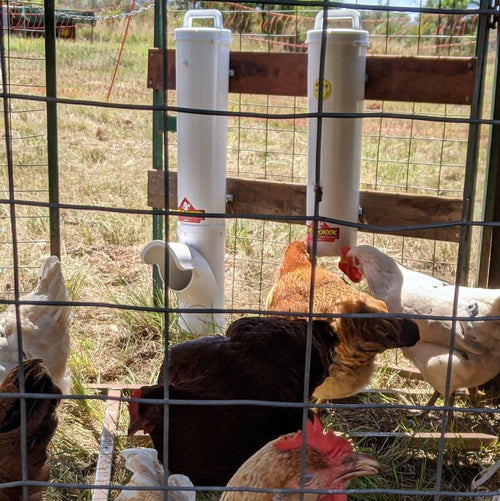Getting started with chickens - NZ Eco Chick
Farmer Liz: Over the past few weeks I have been interviewing bloggers who keep chickens in various situations, in order to help wannabe chicken farmers to get started with their own little feathered egg-producing garden-scratchers. This week I have a new blogger to the series, Madeleine from NZ Eco Chick lives in Wellington, New Zealand, on a suburban block with her husband and is mama to two beautiful boys. NZ Ecochick is about her family and their journey to living a (semi) self sufficient life on their backyard homestead. They live on a quarter acerish section, with four chooks and grow their own food, green and frugal living, diy, crafting and organizing, and their life in general.
 |
| Madeleine with one of her girls |
FL: How many chickens (and other fowl) do you keep, what breed and what do you use them for (meat, eggs, slug control etc)?
M: We currently have four orpington chickens. In the foreseeable future I’m going to Japanese quails as well. I chose orpingtons as they are really big birds and should be able to take on any cats that come on our property (so far they have kept the cats at bay) also they should live for 5-10 years. In the long term the chickens are for eggs and weed control. I’m very excited to announce that this week two of my girls have just started laying which is so exciting. They are also they are suppose to be digging over my garden but they are eating all the good bits of the garden and not doing much digging. grr
FL: Where did you get your first chickens and how do you now replenish your flock?
M: A girlfriend of mine had heaps of them so they were really easy for me to get hold of. Also being a friend she was really glad they went to a good home. These are my first chickens so I haven’t had to get anymore yet.
FL: Fixed chicken run or movable pen? Why?
We have a fixed chicken coop that the girls are in if we aren’t home. If we’re home they free range around the garden. However I do want to make a tractor so they can work over areas for me rather than just eating what they want when they want. We have a fixed coop due to being in the city we have strict bylaws and so the coop can only be in one place in the garden.
M: We currently have four orpington chickens. In the foreseeable future I’m going to Japanese quails as well. I chose orpingtons as they are really big birds and should be able to take on any cats that come on our property (so far they have kept the cats at bay) also they should live for 5-10 years. In the long term the chickens are for eggs and weed control. I’m very excited to announce that this week two of my girls have just started laying which is so exciting. They are also they are suppose to be digging over my garden but they are eating all the good bits of the garden and not doing much digging. grr
FL: Where did you get your first chickens and how do you now replenish your flock?
M: A girlfriend of mine had heaps of them so they were really easy for me to get hold of. Also being a friend she was really glad they went to a good home. These are my first chickens so I haven’t had to get anymore yet.
FL: Fixed chicken run or movable pen? Why?
We have a fixed chicken coop that the girls are in if we aren’t home. If we’re home they free range around the garden. However I do want to make a tractor so they can work over areas for me rather than just eating what they want when they want. We have a fixed coop due to being in the city we have strict bylaws and so the coop can only be in one place in the garden.
| the fixed chicken pen |
FL: How do you integrate your chickens into the rest of your garden?
M: The chickens are always let out when we’re home and so they just help themselves around the garden. They love to sit on my backdoor step and peck at the window so we know they are there. John loves to hassle the girls and chase them around the garden. The chickens in turn love to hassle my rabbits guess that’s the pecking order at our home.
FL: What is your biggest chicken challenge at the moment?
M: My biggest problem is getting my chickens to get off my deck and stop eating all my herbs and even sitting on my herbs! They love to eat my saffron leaves which I’m very unimpressed about. I do hate all the poop on the deck and we really need to build a fence.
M: The chickens are always let out when we’re home and so they just help themselves around the garden. They love to sit on my backdoor step and peck at the window so we know they are there. John loves to hassle the girls and chase them around the garden. The chickens in turn love to hassle my rabbits guess that’s the pecking order at our home.
FL: What is your biggest chicken challenge at the moment?
M: My biggest problem is getting my chickens to get off my deck and stop eating all my herbs and even sitting on my herbs! They love to eat my saffron leaves which I’m very unimpressed about. I do hate all the poop on the deck and we really need to build a fence.
 |
| when you plant chickens, try to choose a large enough pot so that they still have plenty of space as they grow.... |
FL: What is the best thing about keeping chickens?
M: I’m enjoying watching the girls run around the garden pecking and fighting between themselves. The thing I love most is knowing exactly where my eggs come from. I love that I feel like we live on an urban homestead now that we have chickens. By some people’s ideas we now are even urban farmers so cool.
This week I went out and we got two eggs from our girls, wow, the feeling of excitement when you get and eat our own eggs is amazing. I had no idea I’d feel so excited by these eggs. I don’t think I’ll ever get tired of going out to the nesting box and collecting fresh free range eggs. Even better knowing the names of the chickens who laid the eggs!
FL: What is your advice to new chicken owners? What do know now that you wish you knew before you got chickens?
M: Chickens really aren’t that scary to own it took me 2 years to decide to get them. I really wish I had known just how easy chickens are to care for I would have got them much sooner.
FL: What if your advice to people who would like to keep chickens in the suburbs?
M: I’d recommend only get three or four chickens as I think more than that would be a struggle to keep in the city. I truly think getting an automatic feeder makes a huge difference in the city as it stops all the extra hassle of feeding the whole neighbourhood and helps keep your backyard cleaner.
FL: Great advice Madeleine, thanks so much for sharing this! I can relate to the poop on the deck too, the only 3 of our hens that are laying at the moment insist on hanging around on the deck, with the dogs, when we aren't home. And that chicken scratching needs to be harnessed for good, or they can do a lot of damage, I have seen what a few stray chickens can do to my garden in a matter of hours, and it is not good. So it definitely pays to have a plan to keep the chickens where you want them.
M: I’m enjoying watching the girls run around the garden pecking and fighting between themselves. The thing I love most is knowing exactly where my eggs come from. I love that I feel like we live on an urban homestead now that we have chickens. By some people’s ideas we now are even urban farmers so cool.
This week I went out and we got two eggs from our girls, wow, the feeling of excitement when you get and eat our own eggs is amazing. I had no idea I’d feel so excited by these eggs. I don’t think I’ll ever get tired of going out to the nesting box and collecting fresh free range eggs. Even better knowing the names of the chickens who laid the eggs!
FL: What is your advice to new chicken owners? What do know now that you wish you knew before you got chickens?
M: Chickens really aren’t that scary to own it took me 2 years to decide to get them. I really wish I had known just how easy chickens are to care for I would have got them much sooner.
FL: What if your advice to people who would like to keep chickens in the suburbs?
M: I’d recommend only get three or four chickens as I think more than that would be a struggle to keep in the city. I truly think getting an automatic feeder makes a huge difference in the city as it stops all the extra hassle of feeding the whole neighbourhood and helps keep your backyard cleaner.
FL: Great advice Madeleine, thanks so much for sharing this! I can relate to the poop on the deck too, the only 3 of our hens that are laying at the moment insist on hanging around on the deck, with the dogs, when we aren't home. And that chicken scratching needs to be harnessed for good, or they can do a lot of damage, I have seen what a few stray chickens can do to my garden in a matter of hours, and it is not good. So it definitely pays to have a plan to keep the chickens where you want them.
If you have anything to add, or want to ask Madeleine some questions about this post, please head over to NZ Eco Chick and leave a comment.
By the way, my chicken eBook is now available if you want to know more about backyard chickens and using chicken tractors. More information over at the chicken tractor ebook blog. Or you can get it directly from my shop on Etsy (.pdf format), or Amazon Kindle or just send me an email eight.acres.liz {at} gmail.com.
or just send me an email eight.acres.liz {at} gmail.com.
What's the eBook about?
Chickens in a confined coop can end up living in an unpleasant dust-bowl, but allowing chickens to free-range can result in chickens getting into gardens and expose them to predators.
A movable cage or “chicken tractor” is the best of both options – the chickens are safe, have access to clean grass, fresh air and bugs. Feed costs are reduced, chickens are happier, and egg production increases.
But how do you build a chicken tractor? What aspects should be considered in designing and using a chicken tractor effectively? In this eBook I aim to explain how to make a chicken tractor work for you in your environment to meet your goals for keeping chickens.
I also list what I have learnt over 10 years of keeping chickens in tractors of various designs and sizes, from hatching chicks, through to butchering roosters.
Reviews of the Design and Use a Chicken Tractor
























Leave a comment